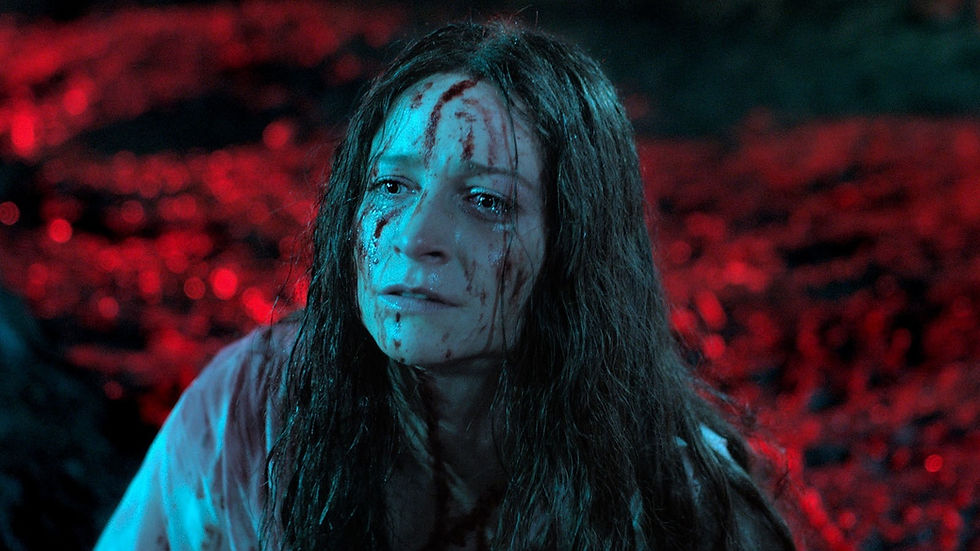Kelly Mintzer say she marvels at the way Censor blurs reality lines through an unreliable female protagonist.

Censor (2021) quietly made an entrance into the world last summer. Prano Bailey-Bond’s debut film may not have ignited popular discourse on fire, but the horror world took notice. The film is a singular vision—the most lean and cruel eighty-four minutes horror fans could hope for in a genre film.
Enid (Naimh Algar) works as a British film censor during the height of the video nasty era. She leads a quiet existence, but is traumatized by the disappearance of her sister, Nina (Amelie Child Viliers). Nina vanished in the woods several years earlier, with only a young Enid (Beau Gadsdon) to witness the events that lead to her disappearance. However, Enid has repressed these memories. Her parents have finally decided, after many years, that it is time to declare Nina dead. Enid has trouble letting go. Especially when she spots actress, Alice Lee (Sophia Le Porta) while censoring 'Don't go in the Church', a film that closely mirrors Enid’s childhood trauma. Alice is a dead ringer for Nina, or so Enid believes and convinced that she has found her sister, Enid follows a steady network of sordid connections through the underbelly of banned films.
Censor could exist simply as an example of the banned films it mentions, however, it manages to exceed this inspiration in a myriad surface level and thematic ways. It is a lean film, clocking a fairly short runtime, yet there is plenty of grit in its delivery. While there isn’t an excess of gore throughout the film, the few scenes that employ it hit hard.

Let’s begin with the aesthetics. Where video nasties relied heavily on the explicit display of graphic violence, Censor is able to weaponise the implication of brutality. We witness Enid’s reaction to the kills and we hear people discussing them. Scenes of Enid and co-workers laughing over particularly over-the-top violence tells us that Enid has a strong constitution. So, when she eventually does recoil, we know that what she sees on the screen is highly emotionally triggering and graphic.
Censor is vaguely reminiscent of Berberian Sound Studio (2012), in that it looks at how the sausage is made, and then in its superior use of sound design, proceeds to make a better sausage out of the raw materials. The combined effect of Enid’s reaction and the foley design of the invented films-within-the-film end up being far more impactful than any actual image could be. Also, like Berbarian, the film pulls a rather impressive magic trick. It shows us what should be a demystification, the banal day-to-day components of making horror films and builds a scarier horror film out of that.
"People think that I create the horror, but I don't. Horror is already out there, in all of us. It's in you."
Censor is very invested in the way that not just horror, but media in general, can impact our daily lives. The film wisely suggests that there is not one blanket answer. It points out that plenty of people are in fact aware of the difference between fact and fiction—that these films serve simply as escapism. Enid doesn’t enjoy or seek out horror films, they’re simply a necessary evil of her job. She is not their target audience, so their bleed through into her everyday existence isn’t a result of "appealing to a certain type of person", as these things are often framed. In fact, while a murder occurs that seems to mirror one of the films Enid was involved in censoring, it is eventually revealed that the perpetrator never actually saw the video nasty at all. The press wrongfully credited the horror film as inspiration for his actions.
Wildly entertaining and perfectly paced—there is absolutely no unnecessary excess to this film, yet it manages to slyly sneak several salient pieces of social commentary within its fabric. Enid’s experience is uniquely female. She is treated with markedly less respect, and simultaneously, as more fragile than her male counterparts. A film producer, Doug Smart (Michael Smiley), makes a "casual" comment to Enid about her being raped on film and not one of her professional counterparts stands up for her to point out how wildly inappropriate and threatening the statement is. While the film is certainly not solely a rumination on the experience of women in horror, or film in general, it is impossible not to recognize that Enid’s gender looms heavy over the narrative and that it impacts every aspect of her life.

Perhaps the most truly subversive element of Censor is that women are rarely afforded such meaty roles in horror. Enid has no romantic subplot and is not pursued or chased by anyone. She is no one’s "final girl". She is given a rich, internal life, without ever being victimized, because that is what the careful writing allows.
The most rewarding aspect of the film, is the exploration of the unreliable narrator. We learn early on that Enid has a history of seeing Nina in random women, but we are also closely bound to her viewpoint. Is Alice Lee actually Nina or simply another surrogate for Enid’s mania? The film wisely refuses to fully commit until we reach its climax---one that will leave viewers shaken and shocked. Earned and inevitable, Censor is home to one of the most chilling endings of a film seen I've seen in the last ten years.
Censor is currently streaming on Hulu and Shudder.

